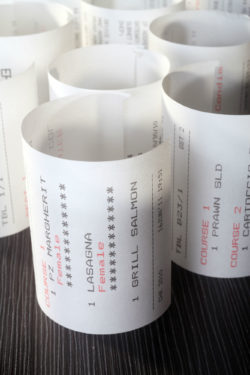Top Class Actions’s website and social media posts use affiliate links. If you make a purchase using such links, we may receive a commission, but it will not result in any additional charges to you. Please review our Affiliate Link Disclosure for more information.

FACTA was enacted as an amendment to the Fair Credit Reporting Act (FCRA) to help protect Americans from identity theft.
If you or someone you know have made purchases and a retailer printed more than the last 5 digits of your debit/credit card and/or included any part of your debit/credit card’s expiration date, the retailer could be in violation of FACTA and has violated federal law.
Overview: Filing a FACTA Lawsuit
Congress passed FACTA in 2003 in an effort to help curtail and decrease Americans’ risks for identity theft. Credit card or debit card and identity theft are all too common, and so FACTA was enacted to help minimize that risk.
Regulations and rules set forth by FACTA stipulate what may or may not be placed on a printed receipt; regardless of whether the receipt is printed or electronic. What FACTA essentially does is disallow anyone from being able to piece together someone’s credit card or debit card information.
According to FACTA, “no person that accepts credit cards or debit cards for the transaction of business shall print more than the last 5 digits of the card number or the expiration date upon any receipt provided to the cardholder at the point of the sale of transaction.”
In place of important credit/debit card information, such as the expiration date or credit/debit card numbers, are symbols. These symbols can be an *, or #, or any other wildcard character, that is set repeatedly in place to cover up those digits.
Digits covered include a consumer’s credit/debit card number (except the last 5) and any portion of a consumer’s expiration date. For example, examples of FACTA violations may include: EXP: 03/17, EXP 03/2017, or EXP 032017, Exp. Date 03/**, and Exp. **/17. Any following example is also a FACTA violation: 2222-4444-6666; 222*-****-**66; 2****-4***-6666; and ****-44**-****.
Most credit card accounts are in a sequence of 16 numbers in groups of four numbers. Therefore, by only allowing the last 5 digits of numbers to show, this limits and helps prevent any acts of identity theft from being committed.
Protections against identity theft provided by FACTA also include advent technology known as PAN or primary account number truncation. Its been extensively and internationally used in recent years. PAN truncation is what prevents parts of a consumer’s credit card or debit card and bank account number from being shown on a customer receipt.
Identity theft has affected millions of Americans, and FACTA helps minimize more people from becoming affected and hurt by it. If you or someone you know have been affected by a merchant’s violation of FACTA, then rights as a consumer have been violated.
It is also within your rights to file a FACTA class action lawsuit to obtain recovery against these damages. Successful lawsuits may help in obtaining compensation, even if no damages or identity theft were incurred or reported.
Free FACTA Class Action Lawsuit Investigation
If you made one or more purchases and the retailer provided you with a receipt that contained more than the last five digits of your credit or debit card number or the expiration date, you may be eligible for a free class action lawsuit investigation and to pursue compensation for these FACTA violations.
ATTORNEY ADVERTISING
Top Class Actions is a Proud Member of the American Bar Association
LEGAL INFORMATION IS NOT LEGAL ADVICE
Top Class Actions Legal Statement
©2008 – 2024 Top Class Actions® LLC
Various Trademarks held by their respective owners
This website is not intended for viewing or usage by European Union citizens.














